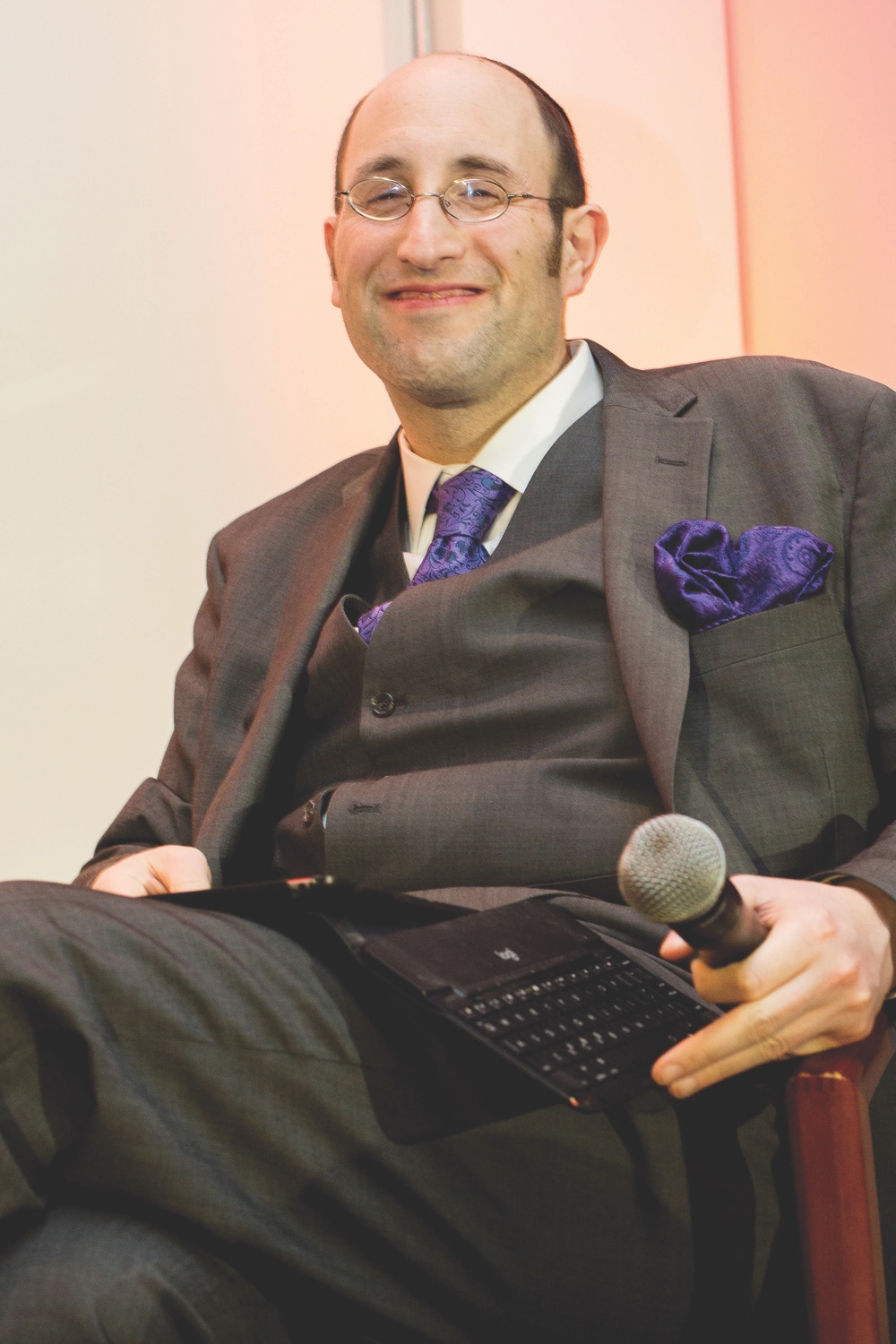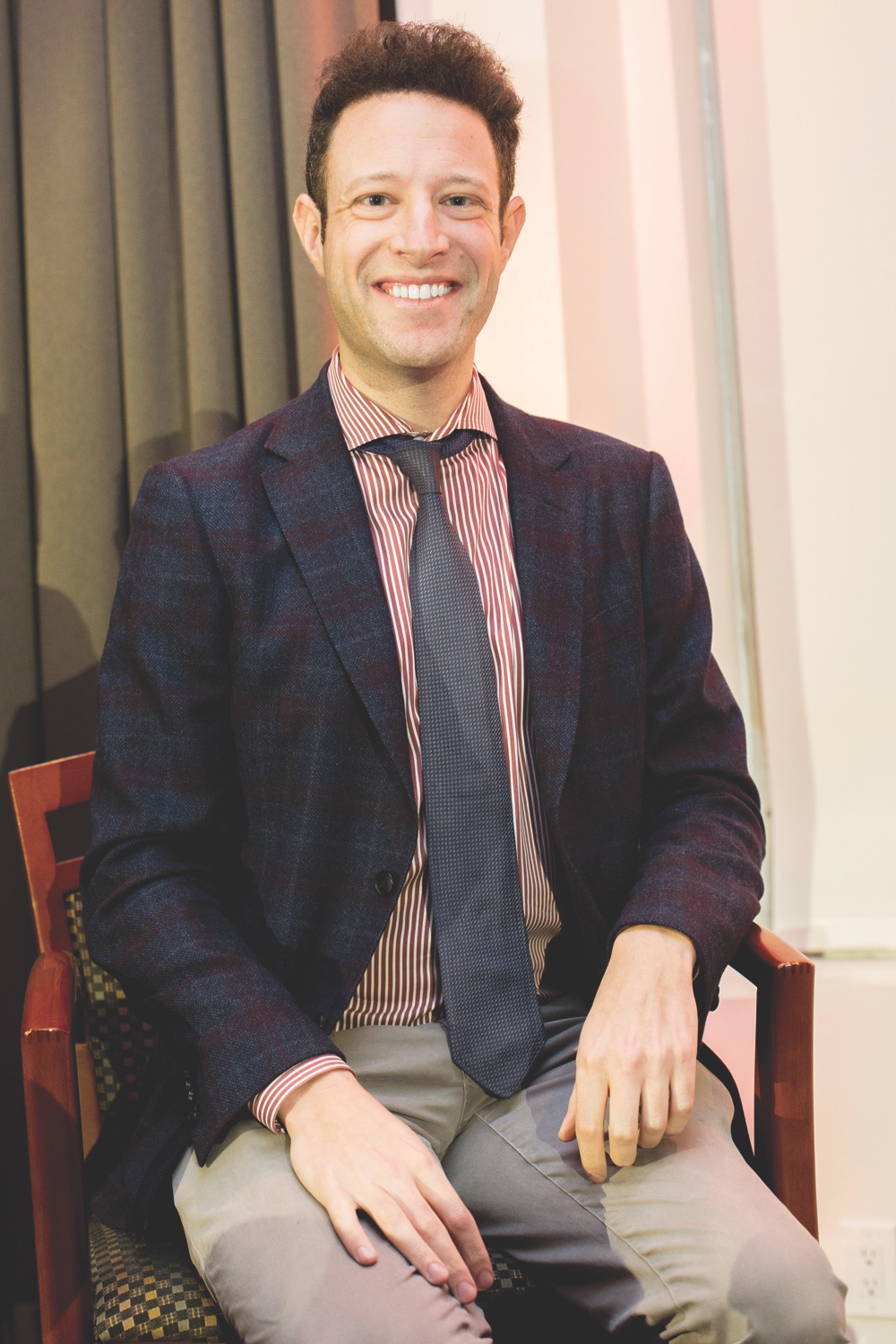
From the dawn of time — or at least for the past two centuries — it seems as if Jews have been obsessed with finding the answers to three monumental questions:
1. Why are we here?
2. How should we live our lives?
3. Was Alexander Hamilton Jewish?
While discussion and study continues about the first two questions, the third question was addressed in knowledgeable and entertaining fashion on Feb. 7 at Beth Jacob Congregation in Beverly Hills. Before a packed and enthusiastic audience, Rabbi Meir Soloveichik discussed the question with law professor Andrew Porwancher.
Generations of biographers have written that Hamilton — a Revolutionary War hero, co-author of “The Federalist Papers,” the first secretary of the treasury and the subject of a boffo Broadway musical — was a Christian. But Soloveichik and Porwancher, who came armed with a load of supporting archival research, made their case that Hamilton was, in fact, born and raised as a Jew.
The two scholars are well-qualified to expound upon this topic. Porwancher is an associate professor of law at the University of Oklahoma, where he teaches legal history. He earned his doctorate from Cambridge, his master’s from Brown and his bachelor’s from Northwestern. He is currently at work on “The Jewish Founding Father: Alexander Hamilton’s Hidden Life” (under contract with Harvard University Press).
Soloveichik is director of the Zahava and Moshael Straus Center for Torah and Western Thought and rabbi of Congregation Shearith Israel in New York City. He graduated summa cum laude from Yeshiva College and in 2010 received his doctorate in religion from Princeton University. Rabbi Soloveichik has lectured throughout the U.S., Europe and Israel on topics relating to Jewish theology, bioethics, wartime ethics and Jewish-Christian relations.
Why do these two learned gentlemen believe Hamilton was Jewish?
At his Jewish school, Hamilton learned to recite the Ten Commandments in Hebrew.
For starters, Hamilton’s mother, Rachel Faucette, was married off by her mother to Jewish merchant Johann Michael Lavien (a variant of the Jewish name “Levine”) on the Danish-controlled Caribbean island of St. Croix in 1745, a time when Danish law would have required her conversion to Judaism before the wedding. She left Lavien in the early 1750s and lived with James Hamilton on the island of Nevis in the British West Indies. She bore two sons out of wedlock with James Hamilton, one of whom was Alexander, who was born around 1755. This would mean that, according to Jewish law, Alexander Hamilton was born a Jew. Also, while growing up on Nevis, Alexander attended a Jewish school.
Historians have discounted all of these points, arguing that Lavien was not recorded as a Jew in Danish records, and that Alexander Hamilton only attended the Jewish school due to his illegitimate birth, which kept him from being baptized or attending a Christian school. But parish records from Nevis show that infants born out of wedlock were indeed baptized. Plus, observed Porwancher, “None of St. Croix’s Jews were identified in the records as Jews.” He added, “If Alexander wasn’t Jewish, he would have to be the first person in history whose mother was named Rachel Lavien, and who went to a Jewish school, but who wasn’t Jewish. It was simply not a designated category in the island’s registers.”
In his research, Porwancher found a plethora of evidence linking Alexander Hamilton to Judaism, including from one of Alexander Hamilton’s grandsons, who referred to Johann Lavien as “rich Danish Jewish.” Also at his Jewish school, Hamilton learned to recite the Ten Commandments in Hebrew.
Complicating the matter, Porwancher said, is that Hamilton apparently cut his ties to Judaism at the age of 13, when his mother died, not wanting to align himself with what he perceived to be a second-class religious status.


Even so, Porwancher’s and others’ research has revealed numerous ties Hamilton had to Judaism throughout his career. Fighting in the American Revolution and serving as George Washington’s aide-de-camp, Hamilton studied the history of European Jewish banking. While doing so, he formulated the idea of financing the Revolution through credit, an idea which eventually proved successful. In addition, Hamilton was the only Founding Father willing, via his law practice, to represent Jewish clients. And in his copy of Washington’s Farewell Address, he put forth the idea of religious liberty as crucial to the young nation’s vitality.
“It was in Hamilton’s America that an orphan from the Caribbean could become secretary of the treasury,” Porwancher said. “It was in Hamilton’s America that Jews could have equal opportunities and rights.”
“The heart of Hamilton’s story was dispossession,” Porwancher added. Just as the Jews had been dispossessed from their various homelands throughout history, so Hamilton, due to his illegitimacy, had been dispossessed of his inheritance and, despite his accomplishments, always identified with outsiders.
Hamilton was repeatedly accused of promoting practices that benefited Jews. If true, Hamilton’s practices would appear to have been consistent with a European trend at the time, according to “The Hebrew Republic” by Eric Nelson, a book Porwancher recommended. Nelson argues that the familiar story of modern political thought in the West resulting from secularization is wrong. Rather, Nelson contends, it was the Christian encounter with Hebrew sources that led to a radical transformation.
Nelson further argues that Christian scholars began to regard the Hebrew Bible as a political constitution designed by God for the children of Israel. Newly created rabbinic materials became authoritative guides to the institutions and practices of the perfect republic and central features of modern political thought emerged from an attempt to emulate a constitution designed by God.
Even though the Jewish population in colonial America was small, it is telling that the Founding Fathers realized the importance of freedom of worship for even this small minority. In George Washington’s 1790 letter to the Touro Synagogue in Rhode Island, he affirmed his resolve that bigotry would have no place in America and that Jews would not be a tolerated minority but would “possess alike liberty of conscience and immunities of citizenship.”
That commitment has withstood the test of time and surely we have Alexander Hamilton’s ties to Judaism to thank, at least in part, for it.
Mark Miller is a humorist and journalist who has performed stand-up comedy on TV and written on various sitcom staffs. His first book, a collection of his humor essays on dating and romance, is “500 Dates: Dispatches From the Front Lines of the Online Dating Wars.”





















 More news and opinions than at a Shabbat dinner, right in your inbox.
More news and opinions than at a Shabbat dinner, right in your inbox.